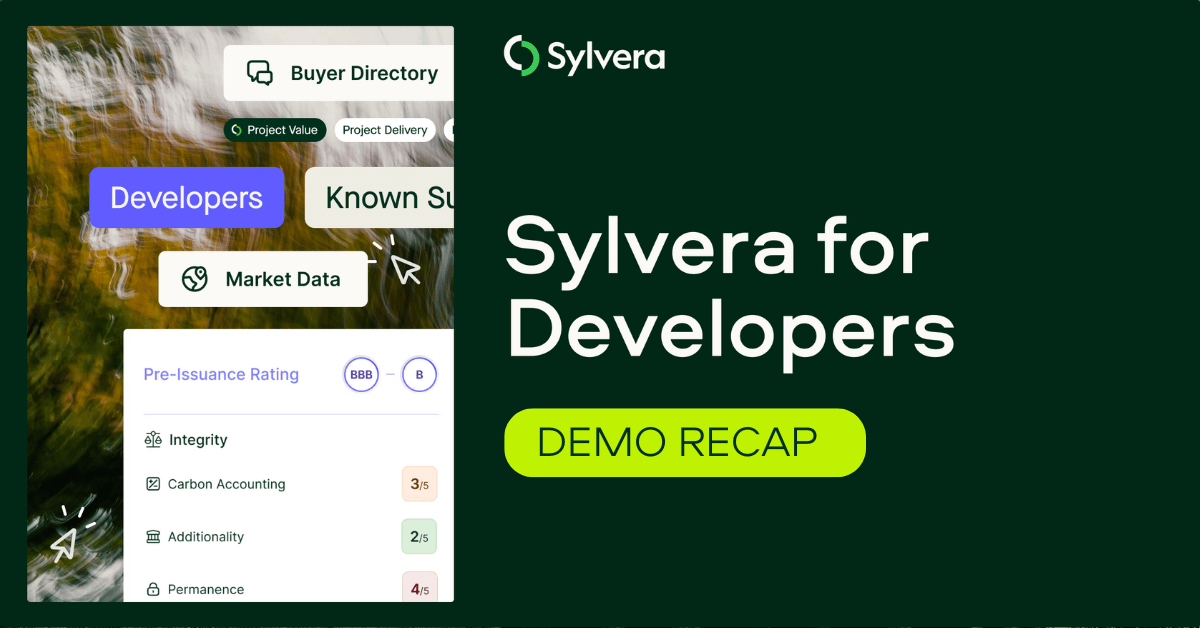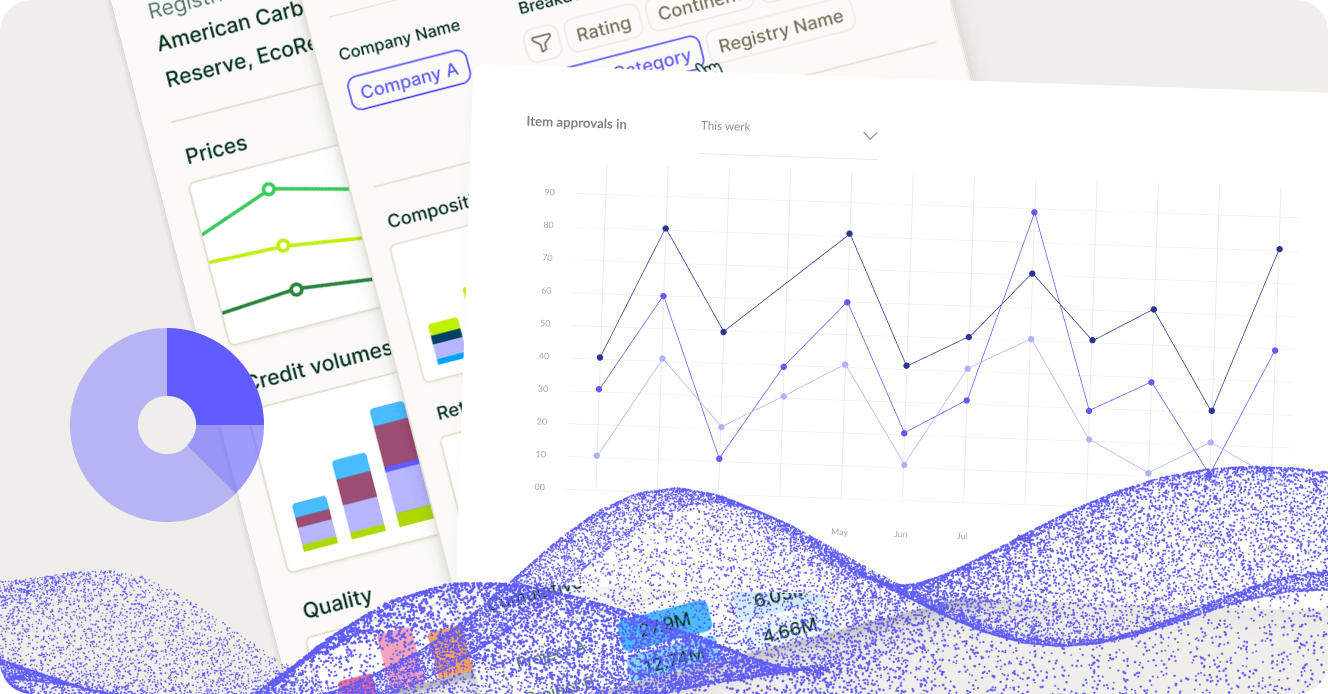“Over the years we’ve invested significantly in our field data team - focusing on producing trusted ratings. While this ensures the accuracy of our Ratings, it doesn’t allow the scale across the thousands of projects that buyers are considering.”
For more information on carbon credit procurement trends, read our "Key Takeaways for 2025" article. We share five, data-backed tips to improve your procurement strategy.

One more thing: Connect to Supply customers also get access to the rest of Sylvera's tools. That means you can easily see project ratings and evaluate an individual project's strengths, procure quality carbon credits, and even monitor project activity (particularly if you’ve invested at the pre-issuance stage.)
Book a free demo of Sylvera to see our platform's procurement and reporting features in action.
Divya Krishnan, Sales Engineer and Jonathan Burns, Product Marketing, hosted a live demo exploring the various data and tools available to project developers in the Sylvera platform.
In this recap, we break down these specific areas and use cases, to help developers along their project development journey from initial planning through credit sales, positioning ratings not just as buyer due diligence tools but as strategic assets for developers seeking to improve market performance.
Informing Project Planning
Market Commentary: Stay ahead of policy and market shifts
Sylvera’s Market Commentary aggregates market news and provides direct access to Sylvera's policy team, applying their knowledge to help developers understand how individual news items fit into broader market trends around Article 6, integrity standards, and quality requirements. This keeps developers informed on emerging policy shifts and buyer preferences that should influence project design decisions.
Country Profiles: Geographic risk intelligence
Sylvera's Country Profiles cover 43 jurisdictions with quarterly updates plus always-on policy team monitoring for significant developments. Each profile assesses delivery risk, utility risk, reputational risk, and Article 6 readiness, providing the geographic risk intelligence that buyer legal teams use when structuring offtake contracts.
This intelligence helps developers understand how buyers evaluate country-specific risks and what safeguards they might require in contracts. For developers selecting project locations, these profiles reveal which countries offer pathway advantages through Article 6 readiness, enabling access to multiple market channels from voluntary markets to CORSIA compliance to bilateral Paris Agreement mechanisms.
Methodology Profiles: Strategic methodology selection
Methodology Profiles provide risk and opportunity assessments for the most pertinent methodologies across proliferating standards and frameworks. The analysis breaks down carbon accounting, additionality, permanence, and safeguards, helping developers understand how methodology translates to market integrity, to market-ready projects on both older and newer methodologies.
The focus stays on actual project outcomes and impacts rather than methodology vintage, though understanding methodology-specific risks helps developers make informed selection decisions and design appropriate safeguards.
Achieve and Prove Quality, Boost Market Access
Project Catalog: Competitive benchmarking
The Project Catalog integrates 18 registries, providing comprehensive visibility across the full universe of registered projects. Developers can filter by project type, country, compliance scheme eligibility, and ratings to understand the competitive landscape in their operating geography.
The catalog answers crucial questions:
- What does good quality look like?
- Who else is developing projects in my region?
- What methodologies are they using and how are they rated?
By examining rated projects, developers identify what drives quality premiums and benchmark against competitors, revealing market gaps and positioning opportunities across different project types and geographies.
Project Ratings: Understanding quality drivers
By drilling into specific ratings drivers, developers understand which factors most influence assessments and can strategically strengthen their projects on dimensions that matter most for quality scores and resulting market premiums.
For example, the Kebali afforestation project in Uganda was highlighted, demonstrating deep rating analysis capabilities. As a BBB-rated project (investment grade threshold), the permanence assessment illustrated Sylvera's comprehensive approach, examining both natural risks like storm, drought, fire, flood, and pest, plus anthropogenic risks including benefit-sharing robustness, land tenure security, funding stability, and project team experience.
Price Your Projects Strategically
Pricing Insights: Modeled price estimates
Project pages include modeled price estimates for different vintages, providing project-specific pricing benchmarks. This integration gives developers immediate visibility into potential pricing for their project type and vintage structure, complementing the broader pricing intelligence available across the platform's comprehensive dataset.
Pricing Dataset: Understanding market dynamics
Using a 300,000+ price point dataset, filterable by project type, region, and country, Sylvera’s Market Intelligence reveals average prices and distributions for each project type, helping understand how ratings directly correlate with pricing. For example, higher-rated ARR projects command higher market prices, with the correlation extending specifically to co-benefits assessments.
Developers are using these dashboards to gain extensive intelligence on what levers to pull, to impact pricing, transforming pricing strategy from guesswork into data-driven optimization.
Off-takes dashboard: Learning from market leaders
An off-takes dashboard tracks all public offtake transactions, showing median prices per project type, off-take volumes and prices over time, and identifying major buyers in the space.
This reveals what market leaders actually pay rather than relying on broker claims, enabling developers to model revenue scenarios based on real-world transactions instead of optimistic assumptions.
Connect with the Right Buyers
Buyer Directory: Identifying target customers
The Buyer Directory tracks retirement patterns across 39,000+ companies, providing crucial demand intelligence. By filtering demand trends by buyer industry and project type, developers identify top historical retirees for their specific project category and which industries favor their project type.
For ARR project developers, for example, this reveals the leading companies and sectors retiring afforestation credits, creating targeted prospect lists for outreach. Retirement data serves as a lagging but valuable indicator of ongoing buyer interest and purchasing patterns across the market.
Connect to Supply: Matchmaking without fees
Connect to Supply operates as a fee-free matchmaking service connecting buyers and sellers. Buyers can click a button on specific projects to request volumes and prices from Sylvera's network of suppliers, developers, intermediaries, and brokers. Alternatively, buyers issue broader RFPs specifying desired project types, vintages, ratings, and other criteria, distributing requests across the supplier network.
On the sell side, developers see these requests flow in and can respond when holding supply meeting buyer criteria. When matches occur, parties connect to advance procurement, with Sylvera taking no transaction fees. This direct engagement eliminates intermediary margins while providing developers visibility into active buyer demand and specific procurement criteria.
Summary: The Sylvera platform for project developers
Strategic Planning
Stay ahead of buyer preferences and policy shifts through daily market commentary, 43+ country risk profiles tracking delivery and Article 6 readiness, and methodology assessments covering accreditation status and market acceptance patterns.
Quality Validation and Competitive Positioning
Benchmark against 18 registries of rated projects to understand what drives quality premiums, identify market gaps in your geography, and validate your project through pre-issuance or post-issuance ratings that strengthen funding cases and prove credibility quickly.
Data-Driven Pricing Strategy
Leverage 300,000+ price points revealing clear quality-price correlations, with specific premiums for higher ratings and robust co-benefits. Learn from public off-take transactions showing what major buyers actually pay, enabling accurate revenue forecasting rather than optimistic guesswork.
Direct Buyer Engagement
Target outreach using retirement patterns from 39,000+ companies to identify which industries favor your project type, then connect directly with buyers through fee-free matchmaking and respond to RFPs without intermediary costs—maximizing your margins while accessing active demand.
Try the platform for free
If you're not already a Sylvera user, you can try out some of the tools in the free-to-access version of our platform.
Book a 1-2-1 demo
Or, book a 1-on-1 demo with our team, where we can focus on your specific use cases.
Join our next live demo
In our next live platform demo, we'll be diving deeper into understanding carbon pricing, including price projections and other use cases of our pricing data.
















